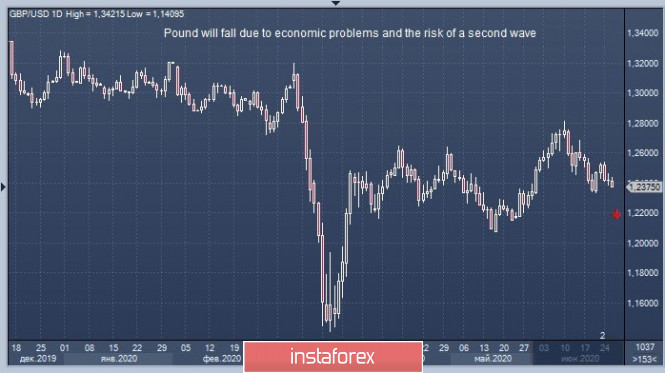
The nearest prospects for the British currency look either vague or rather gloomy for many experts. Analysts fear that the pound will not have enough strength to actively recover and it will be held captive to a long recession.
The L-shaped recession is considered the longest and most difficult to overcome in the analytical community. According to authoritative currency strategist, Robert Albertson, such a recession lasts several years, unlike other force majeure periods, which are limited to one and a half years. Experts fear that such a fate awaits the pound after the British economy plunges into an L-shaped recession. Societe Generale analysts said that the pound will have to fight for a place under the financial sun and wait for the recovery for more than a year and a half.

The Bank of America Merrill Lynch (BoAML) also denies the chance of further growth. Earlier, the bank's currency strategists said that the pound behaves as the currency of emerging markets, and not as one of the leading currencies of the Big Ten (G-10). BoAML focuses on the "neurotic" behavior of the pound, which demonstrates the worst qualities inherent mainly in the currencies of developing countries. A double deficit appears among these qualities, which consists of the general deficit of the state budget and the current account of the balance of payments.
According to BoAML, the UK economy is most vulnerable to such failures. Analysts expect an increase in the double budget deficit of the British economy (up to 10% of production) in 2021. This is much more than in several emerging markets. The current deplorable state has led to a long economic downturn and impressive government spending.
The current situation, along with the threat of an L-shaped recession, can significantly worsen the dynamics of the pound. An additional provocateur of the collapse of GBP, along with the grim consequences of the pandemic of the coronavirus COVID-19, could be the problem of Britain's exit from the EU. Many analysts doubt the possibility of a trade deal between London and Brussels that will suit both sides. A favorable outcome would help the British economy avoid a total subsidence by the end of this year, but this probability is fading every day.
Headwinds of obstacles for the pound are increasing and current difficulties are accumulating, according to BoAML. The Bank believes that the completion of the Brexit transition period, planned in December 2020, but not implemented properly, will lead to a drastic revaluation of the value of the GBP. Experts fear a significant subsidence of the pound, which has become a captive to the L-shaped recession, the exit from which will be very difficult.
Analysts remind that the process of economic "recovery", taking place in the form of L, is actually a long recession, in which recovery occurs at a very slow, almost "turtle" pace. At the same time, the UK is at great risk of a second wave of pandemic, which could rapidly cover its economy and "paralyze" the pound.
At the moment, the indicated currency is experiencing enormous changes in dynamics, for which it received the definition of "nervous" from BofAML experts. On Monday, June 29, the GBP/USD pair is trading in the range of 1.2377 - 1.2379, trying to climb higher. These are extremely low levels, indicating a noticeable subsidence of the British currency. It can be noted that last week, the GBP/USD pair finished at 1.2418 - 1.2420, and it was rising even higher before that.
Despite the possible gloomy prospects for the pound, experts are counting on the GBP's resistance to negative external influences. Experts believe that the British economy has a chance to avoid the L-shaped recession and gradually restore current losses. In the case of the implementation of such a scenario, it will be able to circumvent the "sharp corners" in the form of failures in the economy and Brexit, directing the vector of its movement to an upward trend.
The material has been provided by InstaForex Company - www.instaforex.com